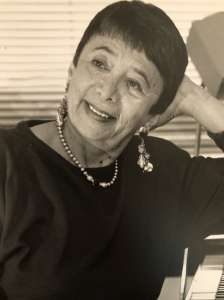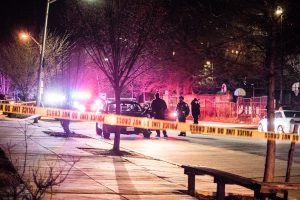An internationally known concert pianist and Holocaust survivor, Agi Rado died Feb. 22 at her home at Springwell Senior Living Community in Mount Washington. She was 90.
The Budapest-born Rado was the daughter of Imre Rado and Valerie Bjor Rado, and her mother was her first piano teacher. Rado made her performing debut at age 11 and graduated from the Franz Liszt Academy of Music in Budapest. She was a protege of famed composer Zoltan Kodaly.
Over the course of her career, Rado performed in 17 countries on four continents at recitals and as a soloist with various orchestras, including 10 appearances with the Baltimore Symphony Orchestra and six recitals for Johns Hopkins University.

The New York Times called one of Rado’s concerts a “stunning performance, full of bravura … unqualified enjoyment …”
Rado was the sole member of her family to survive the Nazi concentration camps. She was a survivor of the Malchow, Rechlin and Ravensbruck concentration camps.
She left her homeland during the Hungarian Revolution of 1956 with her then-husband, Mihaly Virizlay, and became a U.S. citizen in 1962. She spoke frequently spoke in public about her experiences during the Holocaust, as well as with the U.S Holocaust Memorial Museum’s Steven Spielberg Film and Video Archive.
A congregant of Bolton Street Synagogue and longtime North Baltimore resident, Rado taught music at Goucher College and Loyola College. (Rado and Virizlay divorced in 1967 and did not have any children.)
A graveside service for Rado will be held on Feb. 26 at 11 a.m. at Dulaney Valley Memorial Gardens, followed by a 7 p.m. service at Bolton Street Synagogue. Contributions in her memory may be sent to the Bolton Street Synagogue, 212 W. Cold Spring Lane, Baltimore, Md. 21210, or CHANA, 101 W. Mount Royal Ave., Baltimore, Md., 21201.
The following is a Feb. 2017 article and personal reflection about Rado written by Haydee M. Rodriguez, a local freelance writer and one of Rado’s former students:
I met Agi Rado many years ago when I was a philosophy major at Loyola University Maryland and she was on staff in the music department. When I signed up to take piano lessons, I was excited that I would be taught by a renowned, world-class concert pianist.
What I did not know was she was also a Holocaust survivor. I got to know more about Agi as I learned under her expert and gentle instruction, but she never talked about her personal experiences during World War II.
I loved her teaching style – exacting but never stern — and I loved her personality. She had a quiet, dry sense of humor she would show when she could tell I had not practiced my lessons from the previous week. She loved the composer Béla Bartók. Like Agi, Bartók was a fellow Hungarian who learned to play the piano as a child.
I vowed to stay in touch with Agi and regretted that I did not. I graduated college, and life gripped me in its incessant motion forward.
Until this past fall. Although a member of Temple Oheb Shalom, I decided a few months ago to go to Bolton Street Synagogue. I settled into the small, brightly-lit chapel on a cool October night, picking up a Mishkan T’filah, the Reform siddur. As I looked around the room, I saw a familiar face – with a small frame and mostly dark hair — listening attentively to the evening’s sermon. I wanted to bolt from my seat, sprint down the aisle and scream, “Agi, it’s you!” and then hold her in gigantic bear hug.
But I decided it was more prudent to wait until the service concluded.
Catching Up at One World
It delights me that I saw Agi again after so many years just half a mile from my alma mater where she tried to teach me to pay attention to rhythm and timing as I played from Bartók’s piano lessons for beginners.
Was it Bartók’s Mikrokosmos? I do not recall.
We went out to lunch a couple of weeks later. Over asparagus soup and a Portabella mushroom lunch at one of her favorite spots, One World Café, we talked.
Agi is now retired from teaching and spends her days either visiting with friends or swimming three times a week. For many years, she didn’t go to shul since she doesn’t drive and most synagogues are too far away from where she lives.
The arrival of Bolton Street Synagogue at its East Cold Spring Lane location in 2003 ushered in for Agi a reconnection to an established Jewish community. The music that saved her as a teenager coming to grips with being her family’s only survivor of the Nazi madness carried her through adulthood.
“Tell me about your family, Agi,” I asked gently over lunch. And she did.
Agi’s mother, Valerie Bajor (Rado), was a professional pedagogue at a conservatory in Budapest. Agi’s father, Imre Rado, was a transportation official managing all aspects of public transportation in the Hungarian capital.
Agi grew up as an only child and learned to swim at a villa owned by her parents on the shores of one of the largest lakes in Europe, Balaton. When not swimming, Agi rode her bicycle or she practiced the piano under her mother’s tutelage.
Agi’s music lessons started when she was 3. Her mother wanted her to be a concert pianist. She gave her first public concert when she was 11, and as a teenager continued to learn under the tutelage of Zoltán Kodály, a friend and contemporary of Bartók, and a well-known teacher and composer.
As I listened to Agi, I marveled at her ability to laugh. She asked about me – was I married? Did I have children? She laughed heartily when I shared that I had three dogs, all rescued. And she looked serious and concerned when I shared that I had survived uterine cancer.
Laughing Over Crying
We kept talking. I thought to myself, how do we remain respectful to Holocaust survivors while keeping our commitment to never forgetting?
And as the words “We must never forget” whirled around in my head, I asked, “Agi, you survived the Holocaust. I love to hear your laughter, but must ask: how did you manage to retain your sense of humor?”
Her response surprised me, “Thank God,” she said. “I like laughing more than crying. It’s like asking, ‘How do you keep your eyes brown?’ You either have it, or you don’t.”
She shared a story about her teacher and mentor, Kodály. After somehow surviving Ravensbrück concentration camp and its sub-camps, Rechlin and Malchow, Agi made her way back to Budapest. She was skinny and her clothes ill fitting. “I ate everything in sight, and for a very long time, my own screams awakened me at night,” she recalled. “And I cried every night.”
Months later, she managed to gain weight, becoming, according to Agi, “Overweight.”
Laughing now, Agi tells me Kodály was a very serious teacher, and as she roared with laughter when she heard him repeat one of the phrases in a Hungarian folk song, “Why are you so skinny?” the images of herself — from an emaciated concentration camp prisoner to an “overweight” survivor — rushed through her head. She simply could not stop laughing.
And the more serious Kodály’s facial expression became as he looked at her, the more she laughed.
“The only thing that kept me alive was my mother’s wish that I succeed. And without Margit, I would not have been able to make it,” Agi said. “It is a miracle that I am alive.”
Margit Adler was her “auntie” who helped nurse her back to health. Agi left Hungary in 1956 and arrived in the U.S. as a refugee. She left behind Margit and her beloved Yeller, a blueish, miniature parakeet who had learned to say Agi’s name and would call out, “Go and practice” and “You are a lazy bird.” Yeller, remembers Agi smiling, would sleep on her pillow.
Again, I asked Agi, in a futile attempt to understand how one survives devastating losses, “How did you go on, Agi?”
She replied, “You have no other choice. You do it the best that you can.”
I switched the subject. “What about classical music, Agi? Where is it now?”
“It is in a difficult position,” Agi replied, “particularly since classical music requires knowledge and understanding, and non-classical music doesn’t need anything to be enjoyed by the crowd.”
“Is there a future for classical music in this day and age?” I asked.
Looking at me pensively, Agi said, “I am hopeful that there is. It cannot be wiped out after centuries of existence.”
Just like the Jewish people, I thought to myself.
Haydee M. Rodriguez is a Baltimore-based freelance writer.





